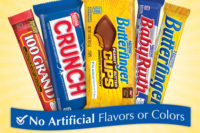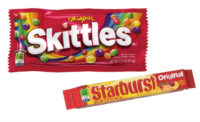Soon, when consumers “Taste the rainbow” in a bag of Skittles, they’ll be tasting an all-natural rainbow.
Mars, Inc. has announced plans to remove all artificial colors from its human food products as part of what it says is a commitment to meet evolving consumer preferences.
Products across the range of the company's chocolate, gum, confection, food and drink businesses will be affected by the change, which will take place incrementally over the next five years.
That includes brands such as M&M’S, Starburst and Skittles — all of which are known for their vibrant candy hues.
Mars is the second major candy maker to make such a change. About a year ago in Feb. 2015, Nestle announced that it would commit “to removing artificial flavors and FDA-certified colors, like Red 40 and Yellow 5, from all of its chocolate candy products.”
However, Nestle was reformulating chocolate products like Butterfinger and Crunch, which don’t present the same challenges that more colorful products like those in the Wrigley portfolio will.
Mars says it is committed to providing the same “great tasting products,” but admits that, “replacing artificial colors across all our products is a complex task.”
“We expect it will take about five years to develop the full range of alternatives that guarantee the integrity and great taste of the products you know and love, and to go through the process of obtaining regulatory approval for all new ingredients in development,” Mars says.
Indeed, Joni Stern, president of Stern Ingredients, cautions that Mars has a long road ahead.
“A lot of people are not understanding this process, because we don’t have a [natural color] match for everything that’s out there,” she says. “The costs are going to [increase]. The colors are not going to be as vibrant.”
Also, some natural colors may not appeal to consumers, such as those made with cochineal and carmine.
“Those are natural colors and they come from bugs in South America,” Stern says, comparing it to adding cricket to increase the amount of protein in a nutrition bar. “Yeah, it’s approved, but do you want to eat a fragment of a cricket?”
She said the race is now going to start to find realistic alternatives.
“What happens when these companies announce these things, the clock starts ticking in the R&D office,” Stern explains. “Which means they have to basically get samples in of natural colors... and then they have to make samples up, and they have to go for shelf life testing, so the whole process can easily take a year or more.”
Mars admits that removing all artificial colors from a human food portfolio that features more than 50 brands represents a complex challenge.
The food company’s strategy includes partnering with suppliers to identify new ingredients and formulas that meet its rigid safety and quality standards, addressing all legal and regulatory requirements, and creating accessible ways to gather input and feedback from consumers throughout the reformulation process.
Though many of Mars’ products are already free of artificial colors, by expanding the scope of the effort to its entire human food portfolio, the company is making a commitment of significant depth and breadth.
“We already offer a range of products that are free of artificial colors around the world. It’s part of our ongoing commitment to meet evolving consumer preferences while taking advantage of new technologies and scientific information,” the company says. “As an example, in the U.S., the FDA has approved Mars’ petition to use spirulina extract as a naturally sourced color additive in confectionery and chewing gum.”
Mars says artificial colors pose no known risks to human health or safety, but consumers today are calling on food manufacturers to use more natural ingredients in their products.
Against this backdrop, Mars will work closely with its suppliers to find alternatives that not only meet its strict quality and safety standards, but also maintain the vibrant, fun colors consumers have come to expect from the company's beloved brands.
"We're in the business of satisfying and delighting the people who love our products," says Grant F. Reid, president and ceo of Mars, Inc. "Our consumers are the boss and we hear them. If it's the right thing to do for them, it's the right thing to do for Mars."





